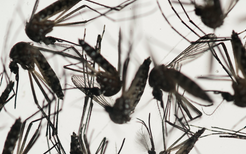NEW YORK -- A first look at U.S. teens and young children who were infected with Zika suggests the virus typically causes at worst only a mild illness.
Zika infection during pregnancy can cause severe brain-related birth defects. But the report seems to confirm health officials' belief that infections after birth in children are similar to infections in adults -- most people don't feel sick, and some develop only mild symptoms like fever, rash, joint pain and red eyes.
Some experts say there's not enough data to answer questions about the virus's potential impact on the developing brains of infants and small children, however.
The report, released Friday by the Centers for Disease Control and Prevention, is based on 158 infections from earlier this year in kids ages 1 month to 17 years.
All the children picked up the virus while traveling abroad, and the bulk of them were older kids in their teens. Only 16 were age 4 or younger, and only four were under a year old. Experts are worried about very young children because they can be more severely affected by infections in general, and because their brains are developing rapidly.
"I'm really concerned about birth through the first birthday," said Dr. Carrie Byington, a University of Utah researcher who focuses on infections in children.
None of the children studied died, and none developed a paralyzing condition seen in some infected adults called Guillain-Barre syndrome.
But Guillain-Barre is rare, seen only once in every several thousand Zika illnesses in adults. It may be that kids can still get it, but there weren't enough cases for it to surface, said Dr. Ganeshwaran Mochida, a pediatric neurologist at Boston Children's Hospital.
Zika outbreaks have swept through Latin America and the Caribbean in the last year, but data on infections in children are limited. Experts have based conclusions about how infections progress in kids partly on what was seen in 10 children in a Zika outbreak on a South Pacific island in 2007.
Zika is mainly spread by a tropical mosquito called Aedes aegypti, though it can also be spread through sex. Mosquitoes have been spreading the virus in Florida's Miami-Dade County, as well as in Puerto Rico and some other U.S. territories.
Most of the more than 3,600 reported infections in the 50 states, including about 800 pregnant women, have been seen in people who traveled to and were infected in Zika outbreak countries.
Also on Friday, the CDC updated its advice to U.S. couples who may have been infected with Zika and are thinking of having a baby. They recommend men use condoms or refrain from sex for at least six months after returning from a Zika-hit area. That's longer than the eight weeks previously recommended because researchers have found that the virus can linger in semen for months. The recommendation for women to use protection remains eight weeks from possible Zika exposure.
On Thursday, the CDC issued a travel notice urging pregnant women to consider postponing nonessential travel to 11 countries in Southeast Asia because of the risk of Zika virus infections.
The countries are Brunei, Burma (also known as Myanmar), Cambodia, Indonesia, Laos, Malaysia, Maldives, the Philippines, Thailand, East Timor and Vietnam. The travel information is less urgent than the travel alerts the CDC has issued advising pregnant women to avoid going to nearly 60 countries and regions because of the active spread of the mosquito-borne virus.
Unlike Brazil and many parts of the Americas that have been hit hardest by the recent Zika epidemic, areas of Southeast Asia have had the Zika virus present for many years. It is considered endemic in these countries, the CDC said in a statement Thursday, and many people who live there are probably immune.
"The level of risk for Zika virus infection in these countries is unknown, but it is likely lower (but not zero) than in areas where Zika is newly introduced and spreading widely," the agency said.
Information for this article was contributed by Mike Stobbe of The Associated Press and by Lena H. Sun of The Washington Post.
A Section on 10/01/2016
